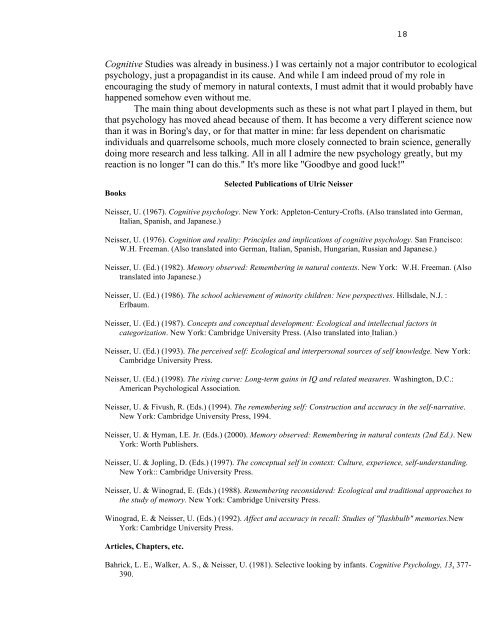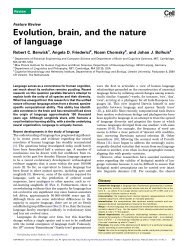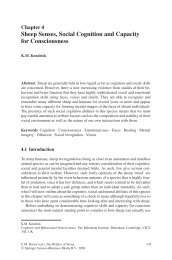Ulric Neisser
Ulric Neisser
Ulric Neisser
You also want an ePaper? Increase the reach of your titles
YUMPU automatically turns print PDFs into web optimized ePapers that Google loves.
Cognitive Studies was already in business.) I was certainly not a major contributor to ecological<br />
psychology, just a propagandist in its cause. And while I am indeed proud of my role in<br />
encouraging the study of memory in natural contexts, I must admit that it would probably have<br />
happened somehow even without me.<br />
The main thing about developments such as these is not what part I played in them, but<br />
that psychology has moved ahead because of them. It has become a very different science now<br />
than it was in Boring's day, or for that matter in mine: far less dependent on charismatic<br />
individuals and quarrelsome schools, much more closely connected to brain science, generally<br />
doing more research and less talking. All in all I admire the new psychology greatly, but my<br />
reaction is no longer "I can do this." It's more like "Goodbye and good luck!"<br />
Books<br />
Selected Publications of <strong>Ulric</strong> <strong>Neisser</strong><br />
<strong>Neisser</strong>, U. (1967). Cognitive psychology. New York: Appleton-Century-Crofts. (Also translated into German,<br />
Italian, Spanish, and Japanese.)<br />
<strong>Neisser</strong>, U. (1976). Cognition and reality: Principles and implications of cognitive psychology. San Francisco:<br />
W.H. Freeman. (Also translated into German, Italian, Spanish, Hungarian, Russian and Japanese.)<br />
<strong>Neisser</strong>, U. (Ed.) (1982). Memory observed: Remembering in natural contexts. New York: W.H. Freeman. (Also<br />
translated into Japanese.)<br />
<strong>Neisser</strong>, U. (Ed.) (1986). The school achievement of minority children: New perspectives. Hillsdale, N.J. :<br />
Erlbaum.<br />
<strong>Neisser</strong>, U. (Ed.) (1987). Concepts and conceptual development: Ecological and intellectual factors in<br />
categorization. New York: Cambridge University Press. (Also translated into Italian.)<br />
<strong>Neisser</strong>, U. (Ed.) (1993). The perceived self: Ecological and interpersonal sources of self knowledge. New York:<br />
Cambridge University Press.<br />
<strong>Neisser</strong>, U. (Ed.) (1998). The rising curve: Long-term gains in IQ and related measures. Washington, D.C.:<br />
American Psychological Association.<br />
<strong>Neisser</strong>, U. & Fivush, R. (Eds.) (1994). The remembering self: Construction and accuracy in the self-narrative.<br />
New York: Cambridge University Press, 1994.<br />
<strong>Neisser</strong>, U. & Hyman, I.E. Jr. (Eds.) (2000). Memory observed: Remembering in natural contexts (2nd Ed.). New<br />
York: Worth Publishers.<br />
<strong>Neisser</strong>, U. & Jopling, D. (Eds.) (1997). The conceptual self in context: Culture, experience, self-understanding.<br />
New York:: Cambridge University Press.<br />
<strong>Neisser</strong>, U. & Winograd, E. (Eds.) (1988). Remembering reconsidered: Ecological and traditional approaches to<br />
the study of memory. New York: Cambridge University Press.<br />
Winograd, E. & <strong>Neisser</strong>, U. (Eds.) (1992). Affect and accuracy in recall: Studies of "flashbulb" memories.New<br />
York: Cambridge University Press.<br />
Articles, Chapters, etc.<br />
Bahrick, L. E., Walker, A. S., & <strong>Neisser</strong>, U. (1981). Selective looking by infants. Cognitive Psychology, 13, 377-<br />
390.<br />
18




